Overview
The article begins by addressing the challenges developers frequently encounter in coding. With the increasing complexity of projects, how can developers enhance their efficiency? This is where Kodezi comes into play, offering a suite of features designed to streamline coding processes. By automating repetitive tasks, Kodezi allows developers to focus on what truly matters—creating high-quality code.
Various programming languages can significantly enhance coding efficiency, with 20 different examples tailored to meet diverse development needs. Each language is examined for its unique features, community support, and compatibility with tools like Kodezi. Furthermore, the integration of automation tools not only aids in improving productivity but also elevates code quality.
Imagine being able to reduce the time spent on mundane tasks. The benefits of using Kodezi are clear: improved productivity and enhanced code quality. In addition, developers can leverage community support to resolve issues quickly, making the coding experience more enjoyable and efficient.
Are you ready to explore the tools available on the Kodezi platform? By utilizing these resources, developers can transform their coding practices and achieve greater success in their projects. The article invites you to discover how various programming languages, combined with Kodezi's innovative features, can lead to a more productive coding journey.
Introduction
In the ever-evolving landscape of software development, developers often face significant challenges when selecting the right programming language. With a myriad of options available, each offering unique strengths tailored to specific tasks, understanding these nuances becomes crucial.
How can developers streamline their workflows and enhance code quality? Enter innovative tools like Kodezi, which are revolutionizing the coding process. By providing automated solutions, Kodezi empowers developers to focus on creativity rather than routine tasks.
This article delves into the key programming languages shaping the industry today, exploring their applications and advantages while emphasizing the importance of leveraging modern tools like Kodezi to maximize efficiency and effectiveness in development.
Kodezi | Professional OpenAPI Specification Generator - AI Dev-Tool: Streamline Your Coding Process
In today's fast-paced development environment, programmers often face significant challenges with documentation. This is where Kodezi comes into play as a professional OpenAPI specification generator that automates the creation of API specifications, significantly decreasing the time spent on documentation. By streamlining the coding process, Kodezi allows programmers to focus on building robust applications rather than getting bogged down in repetitive tasks.
Furthermore, Kodezi’s AI-driven features ensure that the generated specifications adhere to industry standards, which enhances both productivity and code quality. Imagine being able to deploy changes effortlessly as part of your existing release process, automate code reviews, and keep API documentation in sync with code alterations. These capabilities not only save time but also improve overall workflow efficiency.
In addition, Kodezi enables the automatic generation of OpenAPI 3.0 specs from your codebase in mere seconds, making it easier to create and host Swagger UI sites for API testing and collaboration. This comprehensive suite of programming tools empowers teams to enhance their coding productivity and maintain high-quality codebases.
Are you ready to transform your coding practices? Explore the tools available on the Kodezi platform today and experience the difference.
Python: The Versatile Language for Web Development and Data Science
Python is renowned for its simplicity and readability, making it an ideal option for both beginners and experienced programmers. As of 2025, Python continues to lead the programming field, particularly in web design and data analysis, with over 50% of programmers employing it for these objectives. Its extensive libraries, such as Pandas and NumPy, have experienced remarkable growth, with Pandas alone reporting a 30% increase in usage among data scientists in recent years. These libraries promote effective data handling and examination, allowing programmers to manage intricate datasets effortlessly.
In web development, frameworks such as Django and Flask have simplified the process, enabling programmers to create strong systems swiftly. Furthermore, the latest trends indicate a shift towards microservices architecture, where Python's lightweight frameworks are increasingly favored for their flexibility and speed. Real-world instances, such as RWTH Aachen University's Operations Research Program, illustrate how Python's libraries improve coding efficiency by offering students practical experience in addressing real-world optimization challenges.
Expert insights indicate that Python's flexibility is a crucial element in its popularity; it accommodates a broad spectrum of uses, from web development to machine learning. Recent updates to libraries for data analysis have further solidified Python's role in the industry, making it a go-to language for developers aiming to boost productivity and ensure high-quality code. As Donald Knuth wisely noted, there is often a simpler and better way to accomplish tasks, and Python embodies this philosophy through its user-friendly design and powerful capabilities.
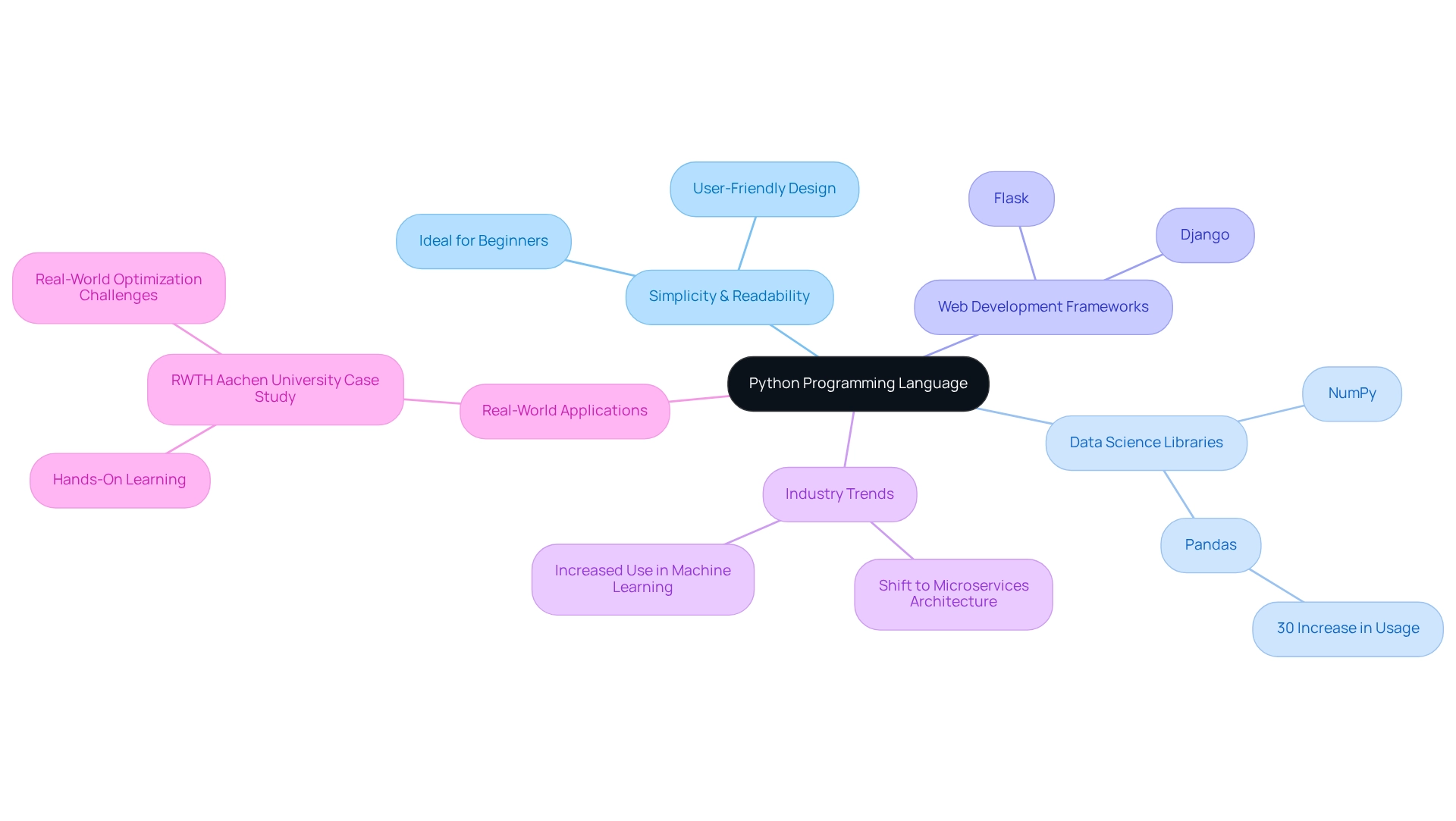
Java: The Backbone of Enterprise Applications and Android Development
Java stands as a fundamental pillar in enterprise software creation, primarily due to its platform independence and robust community support. Its automatic memory management capabilities and extensive ecosystem of libraries position it as an ideal choice for developing scalable solutions. In 2025, Java continues to be the leading force in mobile app creation, particularly in Android, where it commands a significant market share. This versatility is highlighted by the development of over 25 RESTful Web Services and APIs utilizing the Spring MVC framework, showcasing Java's capability in supporting mobile solutions.
Furthermore, the importance of this programming system is underscored by its developed ecosystem, which encompasses a wide range of libraries and frameworks that cater to various coding needs, from scalable web solutions to big data processing and machine learning. This ecosystem is strengthened by the use of Apache Tomcat and MySQL as the web/app server, ensuring robust performance in enterprise environments. In addition, ongoing discussions regarding best practices—such as avoiding common pitfalls when using Java for GeoTools in Geographic Information Systems (GIS)—reflect the community's commitment to upholding high standards.
Expert opinions further reinforce Java's enduring significance in enterprise applications, with many developers recognizing its stability and community support as pivotal factors in their continued use. As Junior Nakamura aptly states, "If you’re looking to future-proof your career in software engineering, Java remains a language that is unlikely to go out of style any time soon." As trends evolve, Java remains a preferred option for enterprise solutions, ensuring that it adapts to the shifting technological landscape while preserving its essential role in Android programming.
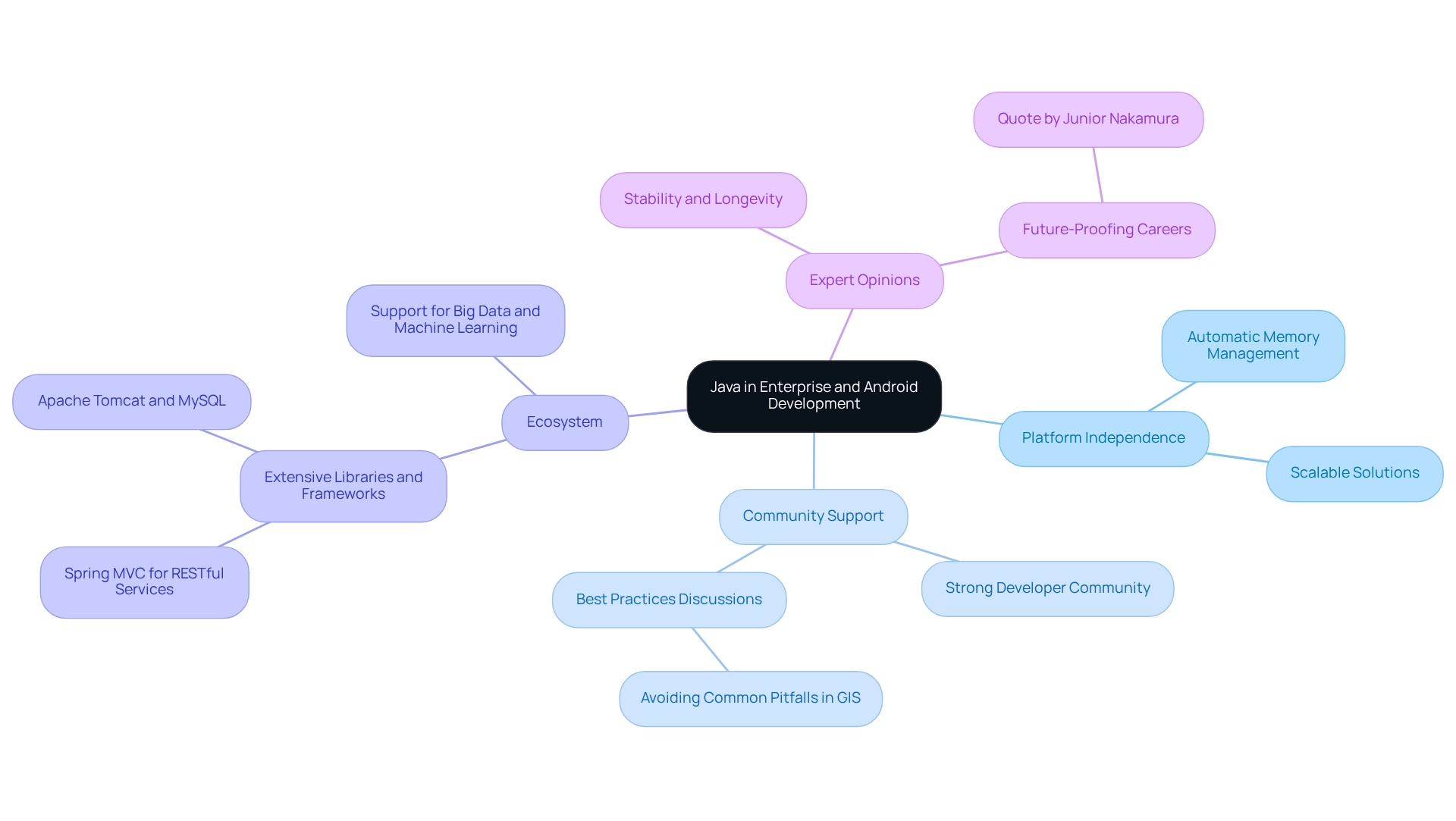
JavaScript: The Language That Powers the Web
JavaScript serves as the cornerstone of modern web development, empowering developers to create interactive and dynamic web solutions. With frameworks like React, Angular, and Vue.js, JavaScript has evolved to support complex user interfaces and single-page applications. Its asynchronous capabilities, driven by Promises and async/await, facilitate seamless user experiences, making it an essential language for web developers.
As we look toward 2025, JavaScript continues to be the most widely used programming language in web development, with current statistics revealing that it powers over 90% of websites. This underscores its vital role in shaping modern web solutions and driving innovation in the industry. The growth of frameworks such as React and Angular is revolutionizing how developers approach web projects, with React leading in popularity and usage. Recent advancements in these frameworks have introduced features that boost performance and enhance user experience, further cementing JavaScript's status in the programming landscape. Additionally, the effectiveness of JavaScript frameworks is evident; studies indicate that 74% of asset tracking projects employing these technologies meet or exceed their ROI, showcasing their significance in delivering successful web applications.
Are you looking to enhance your coding skills and productivity? Consider utilizing Kodezi Code, a versatile tool designed to streamline your programming tasks. In addition, Kodezi CLI empowers teams to auto-heal codebases, ensuring that you never waste time on a pull request again. By leveraging the resources and expert insights available from platforms like IoT Business News, programmers can stay informed on the latest trends and best practices in JavaScript while exploring free trials and demos of Kodezi to boost their efficiency.
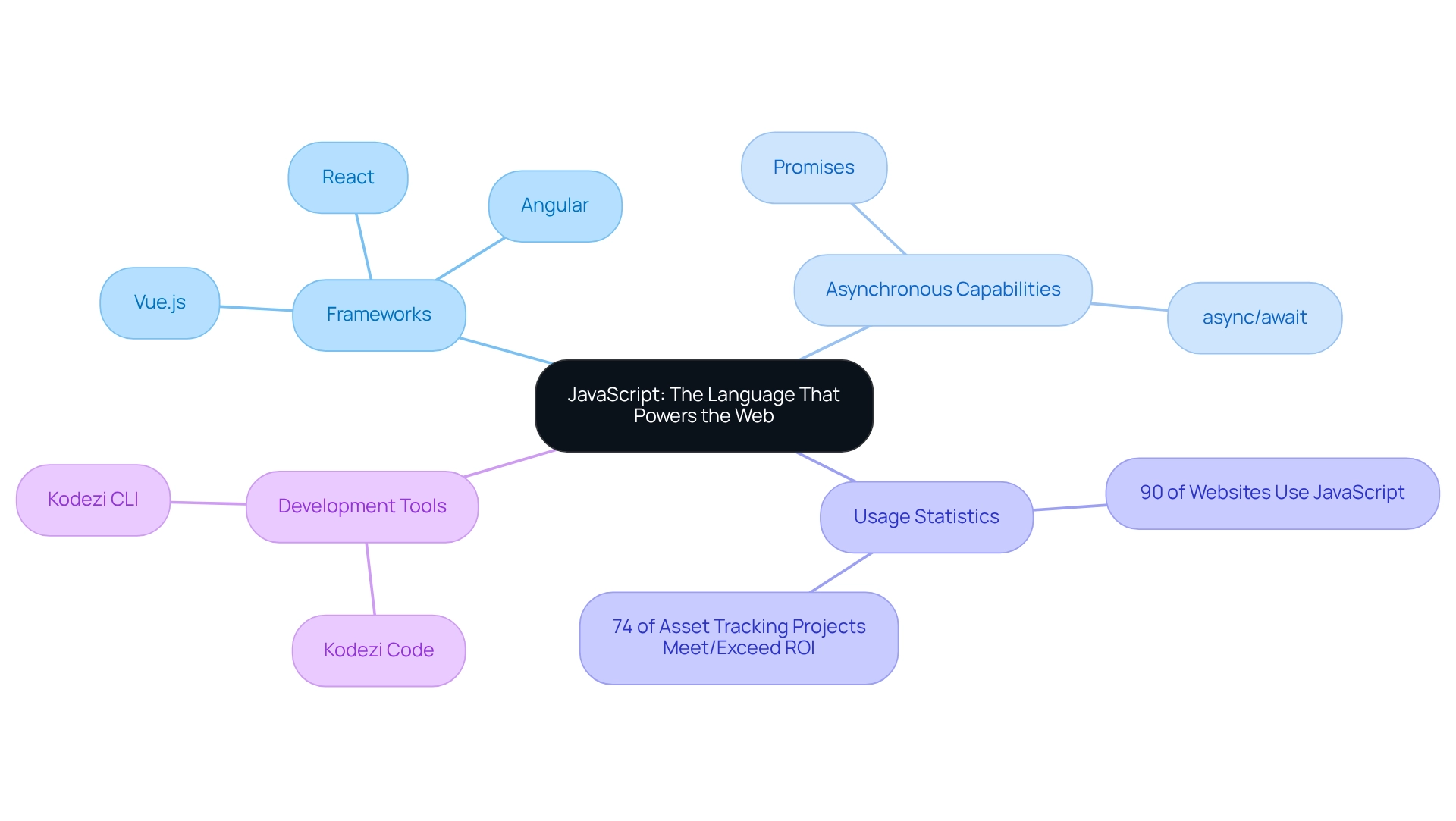
C++: The Language of Performance and System-Level Programming
C++ is a powerful programming tool that provides developers with precise control over system resources. Its performance capabilities make it the preferred language for applications that demand high efficiency, including game development, real-time simulations, and system software. By supporting both procedural and object-oriented programming paradigms, C++ allows developers to select the most suitable approach for their projects.
In the context of game development, C++ is renowned for its performance advantages. How does it achieve this? Developers frequently mention its ability to manage memory and system resources effectively, which is vital for crafting immersive gaming experiences. Current trends reveal that C++ continues to lead the gaming industry, with many prominent game engines, such as Unreal Engine, heavily relying on it for core functionalities.
Performance benchmarks consistently show C++ outperforming many other programming languages in system-level programming tasks. For instance, a comparative analysis indicated that C++ applications can execute tasks significantly faster than those developed in languages like Java or Python, particularly in scenarios that require real-time processing. According to industry insights, C++ is expected to remain one of the top programming languages influencing the tech landscape in 2025, underscoring its ongoing relevance.
Case studies illustrate C++'s effectiveness in both game creation and system programming. One notable instance involves the development of a high-performance game engine that utilized C++ to achieve frame rates exceeding 60 FPS, even under heavy computational loads. This capability is crucial for ensuring fluid gameplay and enhancing user experiences. Additionally, a case study on Assembly highlights the importance of low-level programming for tasks that necessitate direct hardware manipulation, providing a comparative perspective on performance programming.
As we approach 2025, C++ remains an indispensable tool for programmers focused on performance optimization. Recent advancements, including enhanced libraries and tools for concurrent programming, have further solidified its position in the tech landscape. A significant proportion of game developers identify C++ as their primary programming tool, and usage data underscores its importance in both game development and system programming. Overall, C++ is an essential resource for developers aiming to create efficient, high-performance software. Staying informed about industry trends and the demand for programming skills is vital for career growth, making C++ a critical skill to master.
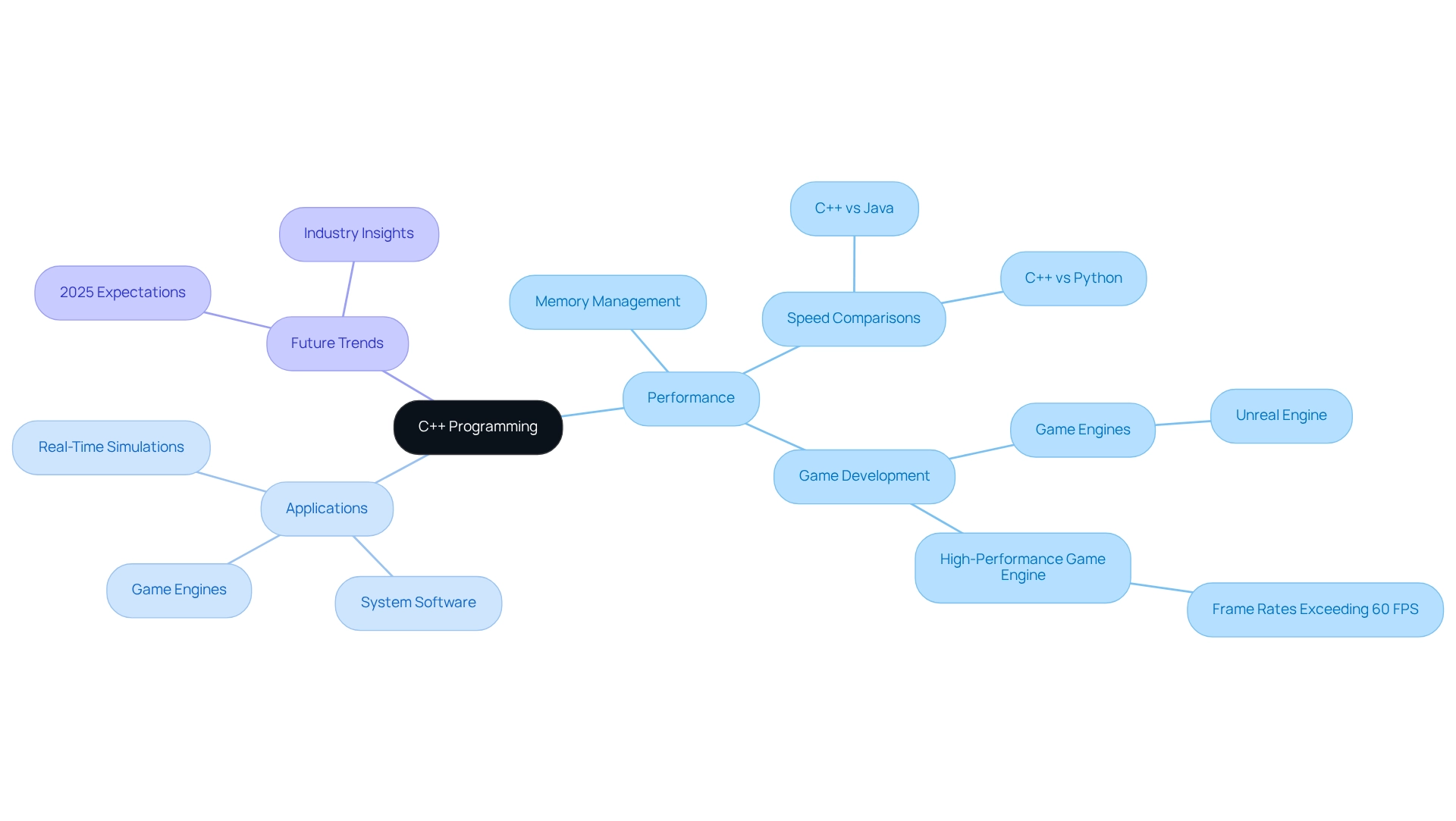
C#: The Language for Windows and Game Development
C# is a versatile programming language created by Microsoft, primarily utilized for developing Windows software and games. Its seamless integration with the .NET framework enables swift software creation, allowing programmers to build robust solutions effectively. As we look to 2025, C# continues to evolve, enhancing its functionalities for both Windows and game development, particularly through its association with the Unity game engine, favored by nearly 50% of game developers for its user-friendly interface and powerful features.
The strong typing and object-oriented characteristics of C# significantly improve code maintainability and scalability, establishing it as a reliable choice for a wide range of applications. For instance, C# supports single inheritance and polymorphism, which not only encourages code reuse but also simplifies maintenance and scalability. This adaptability is essential for developers aiming to create extensible applications that can respond to changing requirements.
Real-world examples illustrate C#'s effectiveness in game development, especially with Unity. Developers have harnessed C# to craft immersive gaming experiences, leveraging its robust event handling capabilities to manage intricate game mechanics. As the gaming industry continues to grow, C# maintains a strong market presence, with many programmers praising its ease of use and powerful features. One programmer noted, "C# with Unity has transformed our approach to game development, making it more intuitive and efficient."
Furthermore, integrating tools like Kodezi can significantly enhance the C# development experience. With Kodezi's automated code debugging, programmers can quickly identify and resolve codebase issues, address performance bottlenecks, and enhance code formatting, ensuring compliance with the latest security best practices and coding standards. This functionality not only boosts performance but also elevates code quality, allowing developers to focus on creating innovative solutions.
Expert insights suggest that C# is gaining recognition for its advantages in Windows software development as well. Its ability to streamline the creation process while ensuring high-quality code makes it a preferred choice among developers. As C# advances alongside the .NET framework, it remains a fundamental element for building modern software, reinforcing its status as a leading language in both Windows and gaming.
To experience the advantages of Kodezi's features for your C# projects, why not consider trying out a free trial or demo?
Ruby: The Language of Elegant Web Development
Ruby is renowned for its graceful syntax and emphasis on simplicity, making it a favorite among web programmers. Have you ever faced challenges in web application development? The Ruby on Rails framework addresses these challenges by promoting convention over configuration, enabling developers to construct applications swiftly and effectively. Ruby's focus on code readability and maintainability fosters collaboration among programming teams, making it a fantastic option for startups and established businesses alike.
As Michael Lopp, a software engineering executive, aptly stated, 'A software metaphor is more like a searchlight than a road map. It doesn’t tell you where to find the answer; it tells you how to look for it.' This viewpoint highlights the significance of Ruby's method to progress.
Furthermore, startups leveraging Ruby on Rails benefit from lower hourly rates for developers, leading to significant cost savings while achieving a 50% faster time to market. In 2025, with 23% of startups embracing agile methodologies, Ruby on Rails remains a leading influence in web creation, boosting both software creation speed and team cooperation.
Additionally, integrating tools like Kodezi can further enhance productivity by providing automatic code correction and bug analysis. How can Kodezi transform your coding practices? By making Ruby development even more efficient and accessible, teams can optimize their coding practices and improve overall code quality.
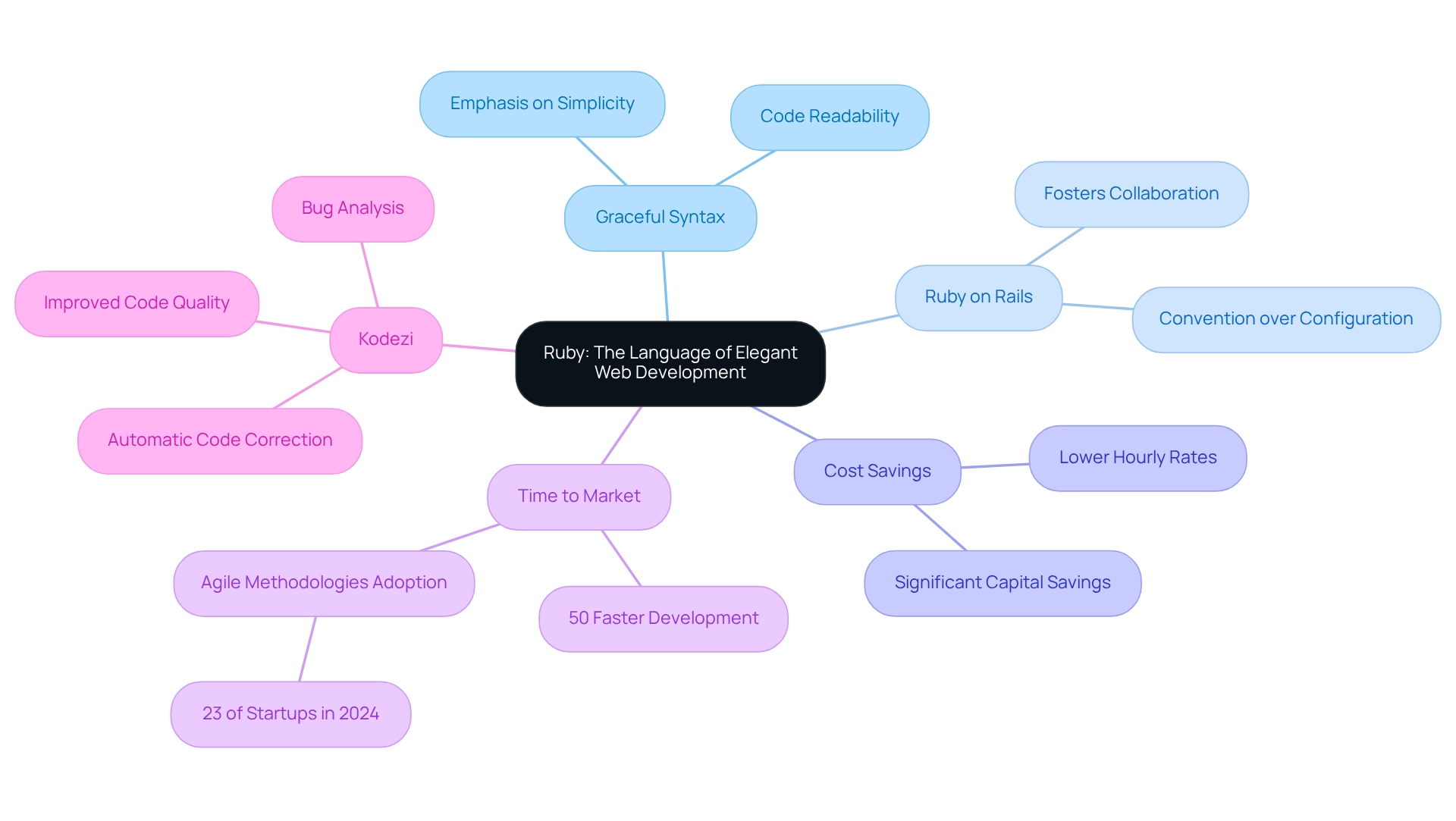
Go: The Language for Cloud Computing and Microservices
Coding challenges can often hinder developers' productivity and the quality of their software. Go, also known as Golang, is a statically typed language created by Google, designed specifically for building scalable and efficient software. Its simplicity and performance make it an ideal choice for cloud computing and microservices architecture. However, developers may encounter issues that can disrupt their workflow.
This is where Kodezi comes into play. With its automated code debugging feature, programmers can quickly pinpoint and resolve issues within their Go software, ensuring optimal performance and compliance with security standards. For example, Kodezi effectively identifies and addresses common concurrency problems that frequently arise in Go, enhancing the reliability of applications.
Furthermore, the Kodezi CLI acts as a versatile tool for teams, facilitating seamless deployment and automation of code reviews. This significantly boosts programming productivity, allowing developers to focus more on writing quality code rather than getting bogged down by debugging. What if you could streamline your coding processes and enhance your software's performance?
To maximize the advantages of Go and Kodezi, developers are encouraged to explore the comprehensive features offered by Kodezi. By doing so, they can transform their coding practices and ultimately improve the quality of their software.
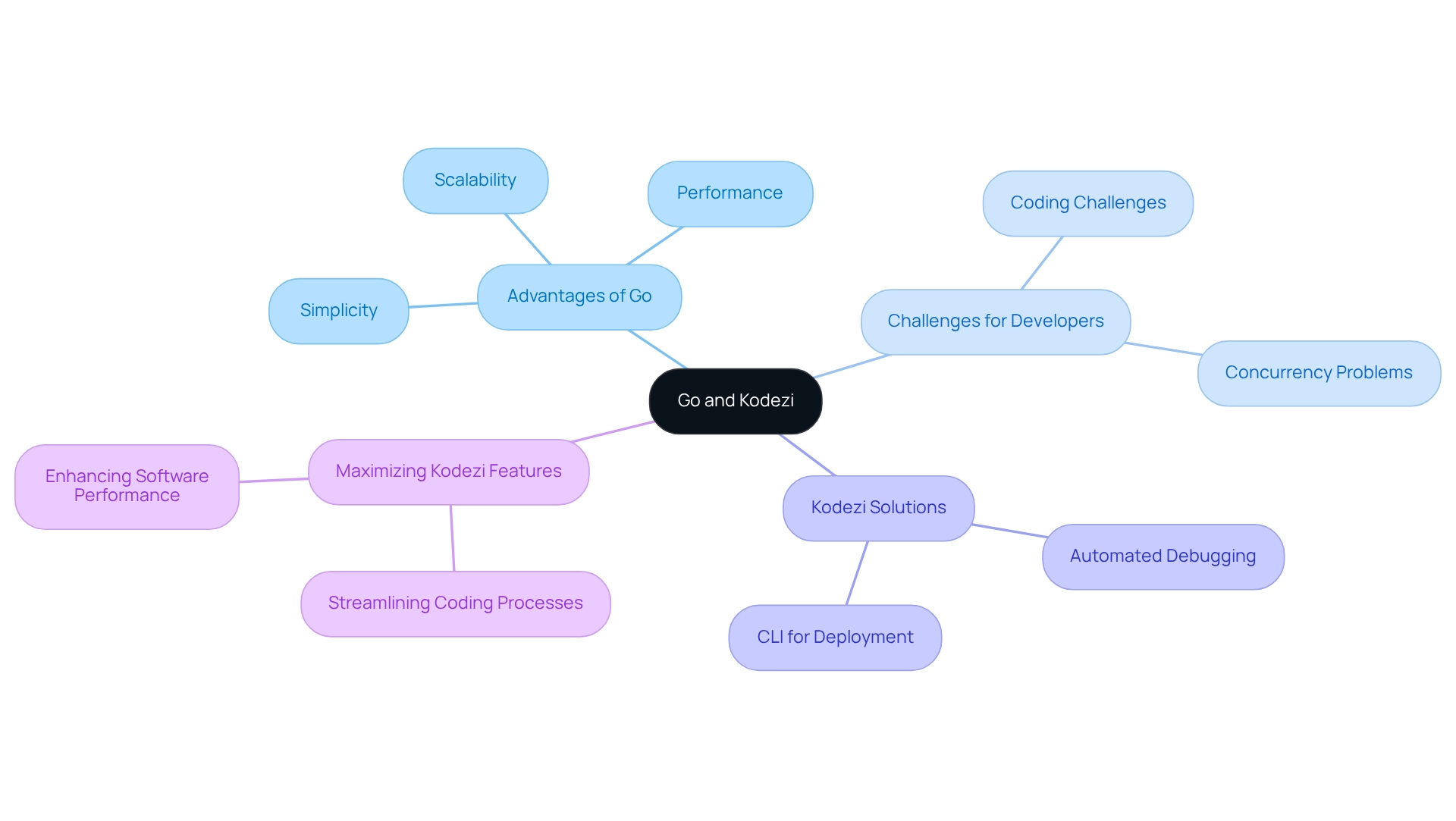
Swift: The Language for iOS Development
Developers often encounter significant challenges when coding, particularly with ensuring safety and minimizing errors. Swift, Apple's contemporary programming tool for iOS and macOS, addresses these issues by emphasizing safety, speed, and expressiveness. Its clean syntax, combined with powerful features like optionals and type inference, significantly enhances code safety and reduces runtime errors. Notably, Swift's performance competes with C++, making it an ideal choice for high-performance mobile software.
Recent enhancements in Swift 6 have introduced features that support the development of smarter, AI-driven software, further reinforcing its status in the evolving tech landscape. For instance, a transition case study from Java to Kotlin within Android programming illustrates the advantages of adopting modern tools. Similarly, Swift's concise syntax streamlines the coding process, leading to improved debugging and overall efficiency.
Developers have noted that Swift's performance and safety features contribute to a more robust programming experience. Performance benchmarks indicate that Swift outperforms Objective-C in various scenarios, showcasing its efficiency in handling complex tasks. As of 2025, Swift continues to gain traction, with a significant percentage of iOS creators favoring it for its benefits in mobile application performance and speed of creation. In a recent survey, 85% of developers reported improved productivity when utilizing Swift compared to Objective-C, highlighting the efficiency of contemporary programming systems in app development.
To further boost productivity, developers can utilize tools such as Kodezi, which provides automated code debugging to swiftly identify and rectify problems within Swift codebases. Kodezi's capabilities ensure that code adheres to the latest security best practices and coding standards, optimizing performance and enhancing overall code quality. Furthermore, the Kodezi CLI serves as a versatile tool for teams, allowing them to auto-heal codebases in seconds, thus streamlining the development process and minimizing time spent on pull requests.
Are you ready to enhance your coding practices? Explore the tools available on the Kodezi platform and experience improved productivity and code quality.
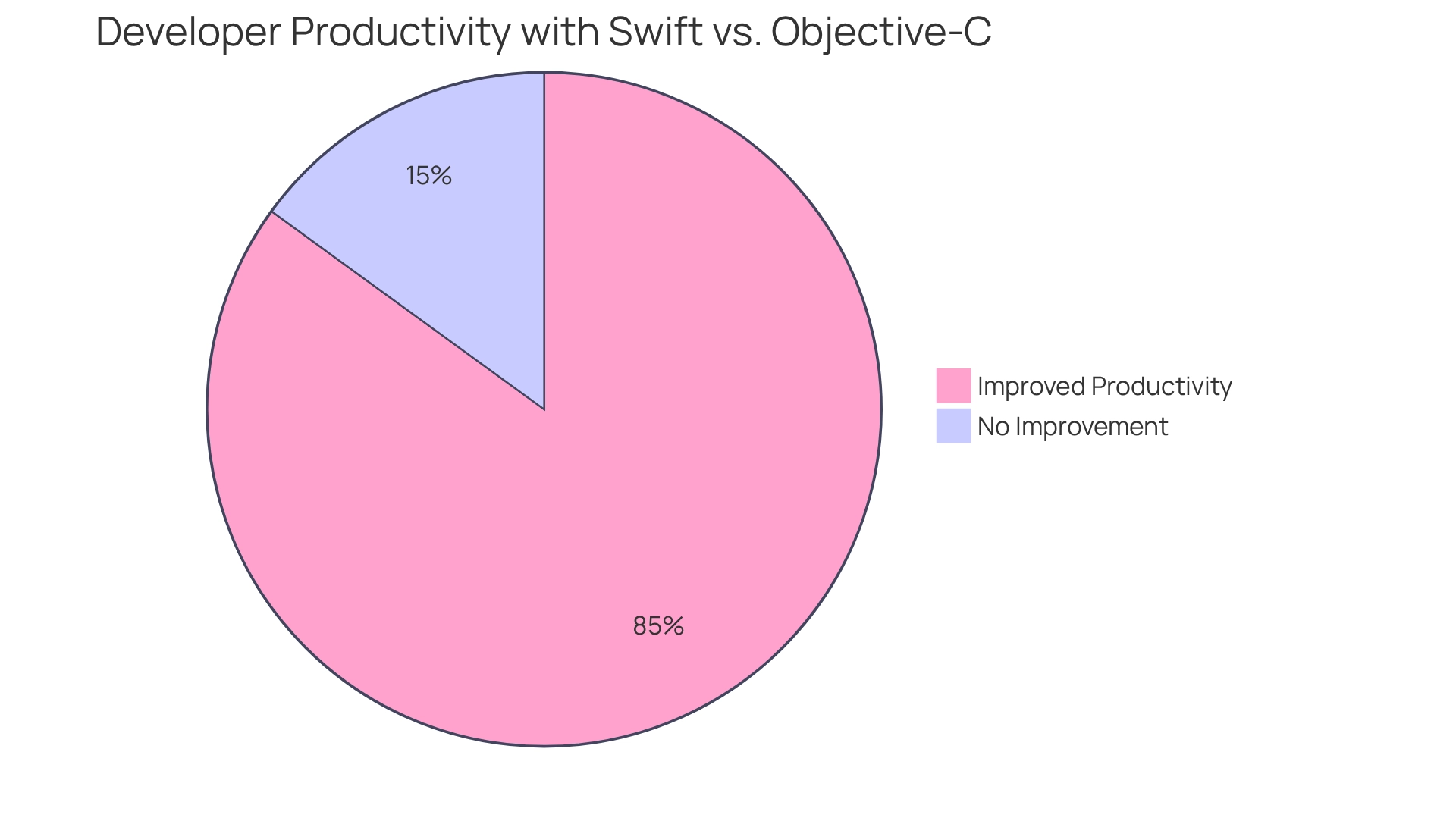
PHP: The Language Behind Dynamic Web Content
Developers often face significant coding challenges that can hinder their productivity and the quality of their work. PHP, a widely-used server-side scripting language, is known for its dynamic web content capabilities. With its ease of use and robust community support, PHP remains a popular choice for web developers. In fact, the PHP Foundation received over $600,000 in donations and investments in 2024, underscoring the ongoing development and backing of the PHP community. PHP frameworks such as Laravel and Symfony provide powerful tools for developing scalable web solutions, while their integration with databases like MySQL ensures effective data management. When selecting a PHP framework, it's crucial to align it with project needs and team capabilities to maximize effectiveness.
In this context, how can developers enhance their coding efficiency? Kodezi emerges as an invaluable resource for PHP programmers, offering AI-driven automatic code correction and bug analysis that significantly boosts productivity. By utilizing Kodezi, developers can streamline their coding processes, ensuring their software is not only efficient but also secure. Implementing optimal methods, such as the MVC design pattern and using Composer for dependency management, is essential for guaranteeing the efficiency and security of web software. A case study titled "Best Practices for Using PHP Frameworks" emphasizes that adopting these practices leads to more maintainable and secure applications, ultimately contributing to project success. With Kodezi's capabilities, PHP programmers can focus on these best practices while minimizing the time spent on debugging and code corrections.
PHP's versatility ensures it remains a key player in the web development arena, boasting a reported usage rate of 76.2% among websites employing server-side programming tools, as noted by Ishan Vyas. Current trends indicate that PHP frameworks are rapidly evolving, adapting to technological advancements and the changing requirements of programmers. This evolution solidifies PHP's role as a vital tool for efficiently creating dynamic web content. Are you ready to explore how Kodezi can transform your coding experience?
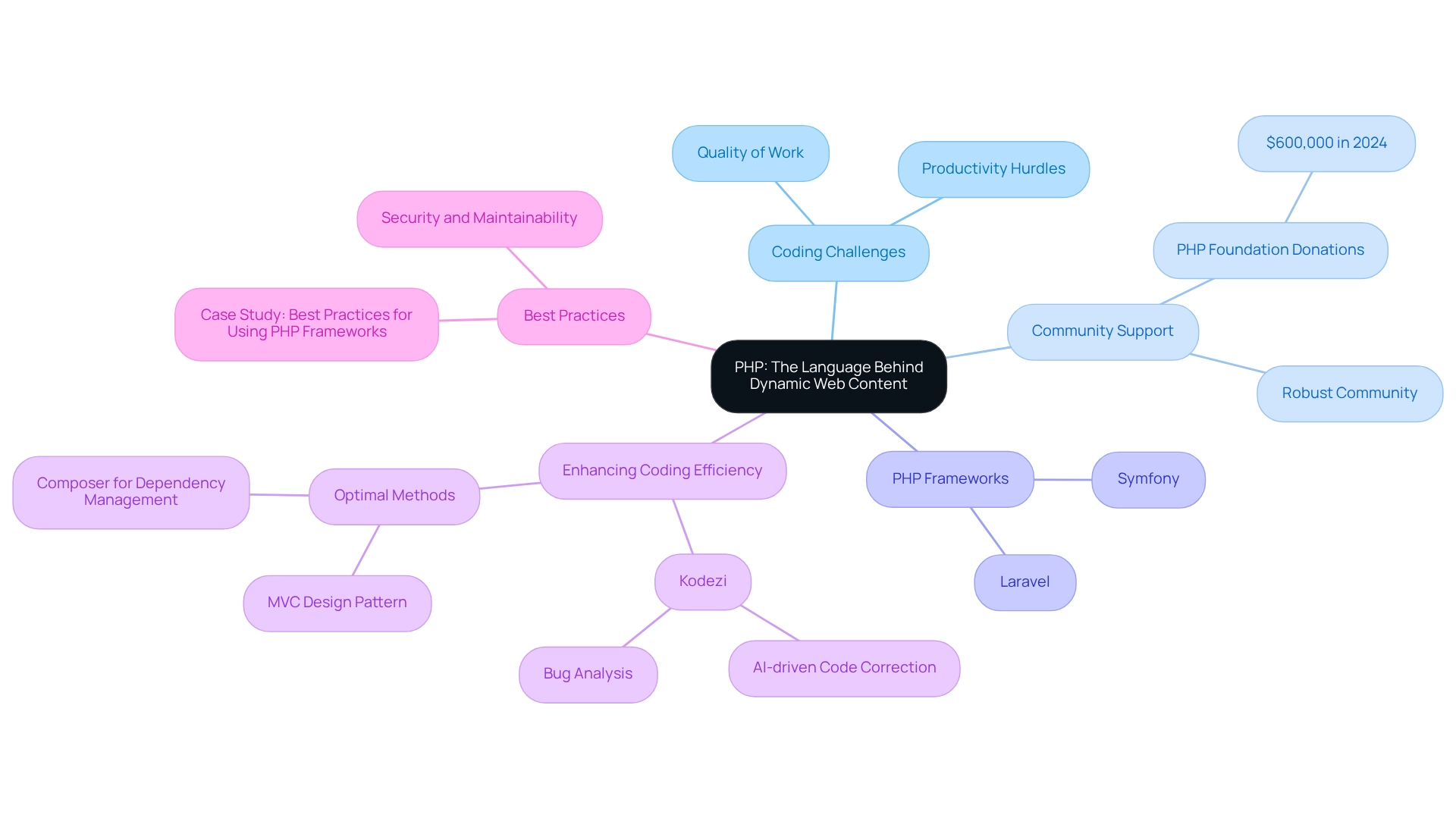
Rust: The Safe and Concurrent Systems Programming Language
Coding challenges are a common hurdle for developers, often leading to frustration and inefficiencies. Rust, a systems programming language, addresses these issues by prioritizing safety and performance. Its unique ownership model effectively prevents memory-related bugs, making it an excellent choice for developing reliable and efficient software. Moreover, Rust's concurrency capabilities empower programmers to create secure concurrent code, facilitating high-performance solutions in various domains, including web servers, game engines, and embedded systems.
In addition, recent advancements in Rust, such as improvements in its ecosystem and tools, further enhance its capabilities. For instance, Kodezi's AI-driven automated code debugging can instantly recognize and resolve issues within Rust software by analyzing code patterns. It offers detailed explanations of the problems faced, ensuring adherence to the latest security best practices while enhancing performance. Furthermore, tools like GitHub Copilot assist programmers in test-driven coding with Rust, optimizing the development process.
Consider a user who shared their experience troubleshooting performance issues in a contract project. This scenario illustrates how Rust's ownership model effectively addresses such challenges. The quote, "I hope it is clear that the use cases are broad," reflects Rust's versatility across various applications. With Kodezi's CLI, B2B engineering teams can independently enhance their codebases and resolve bugs before they reach production. This makes Rust an even more attractive choice for contemporary software creation, ultimately leading to improved productivity and code quality.
Are you ready to explore the tools available on the Kodezi platform? Discover how they can transform your coding practices and elevate your projects.
Kotlin: The Modern Language for Android Development
Developers often face significant coding challenges that can hinder productivity and code quality. Kotlin has emerged as the leading programming tool for Android development, celebrated for its concise syntax and robust features, such as null safety and extension functions. These attributes significantly enhance programmer productivity and improve code quality. Furthermore, its seamless interoperability with Java allows programmers to utilize existing Java libraries while reaping the benefits of a more contemporary language. As the Android development landscape evolves, Kotlin's adoption is projected to increase, with over 95% of the top thousand Android apps already utilizing it. This trend reflects a dynamic job market where Kotlin and Java coexist, yet Kotlin's modern capabilities are increasingly favored.
In addition to Kotlin's strengths, Kodezi's automated code debugging feature enables programmers to instantly identify and resolve codebase issues, including performance bottlenecks and security compliance. This ensures that applications maintain high performance and security standards. By providing detailed explanations and insights into what went wrong and how it was resolved, Kodezi enhances the debugging process, making it faster and more efficient. User testimonials reveal that Kodezi has transformed the debugging experience for over 1,000,000 programmers. Many have noted significant improvements in productivity and code quality, expressing that Kodezi feels like a "superpower" in debugging, allowing them to focus on building innovative solutions rather than getting bogged down by errors.
Expert insights emphasize Kotlin's benefits, especially in improving programmer productivity. By simplifying complex tasks and reducing boilerplate code, Kotlin enables programmers to focus on creating innovative solutions. Real-world examples demonstrate how Kotlin has improved app performance and user experience, leading to higher retention rates. For instance, individuals embracing Kotlin have reported significant improvements in app usability through iterative enhancements driven by user testing and analytics.
As we approach 2025, the need for Kotlin in Android programming is projected to increase, coinciding with the expected growth in popular app categories like social media, e-commerce, and video streaming. This trajectory highlights Kotlin's significance in influencing the future of mobile application creation, making it an essential resource for programmers aiming to enhance their coding efficiency. When combined with Kodezi's AI-driven automated builds and testing, developers can further streamline their coding practices and achieve remarkable results.
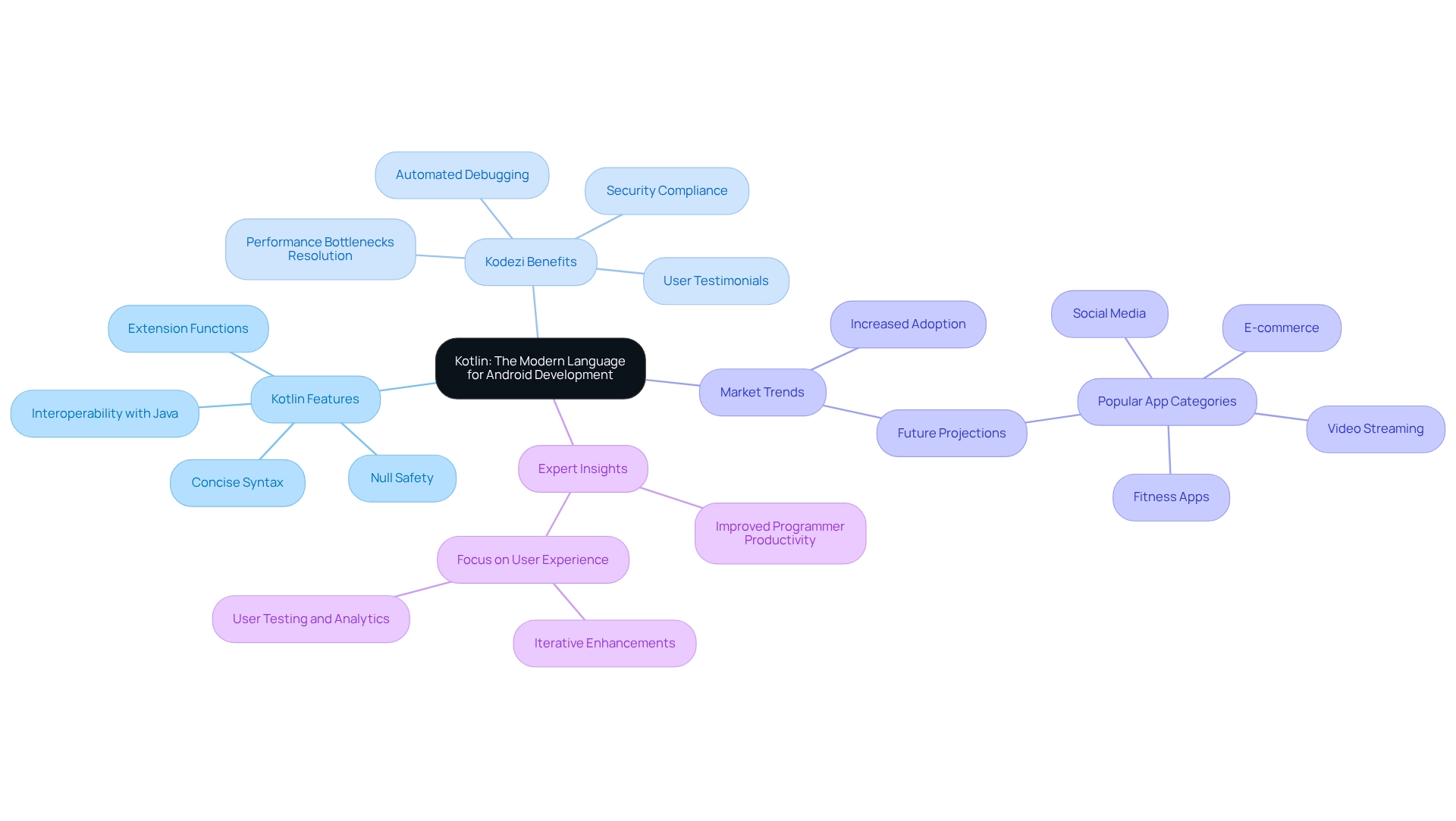
TypeScript: The Typed Superset of JavaScript
In the ever-evolving landscape of software development, developers frequently encounter coding challenges that can hinder productivity. TypeScript, a superset of JavaScript, addresses these issues by introducing static typing, which allows programmers to catch errors early in the development process. This feature not only enhances code quality but also ensures maintainability, making TypeScript a popular choice for large-scale applications.
Furthermore, Kodezi's AI-powered programming tools are designed to tackle these challenges head-on. By automatically debugging and analyzing TypeScript code, Kodezi provides detailed explanations of bug fixes, enabling developers to resolve issues rapidly. This capability not only streamlines the coding process but also ensures adherence to the latest security compliance standards, ultimately optimizing performance and enhancing overall code quality.
In addition, the compatibility of TypeScript with existing JavaScript code allows developers to adopt it incrementally. This incremental adoption makes TypeScript an attractive option for teams aiming to improve their codebase without the need for a complete rewrite. Imagine the efficiency gains your team could achieve by integrating TypeScript with Kodezi's tools.
Are you ready to elevate your coding practices? Explore the powerful tools available on Kodezi's platform today and experience the benefits of improved productivity and code quality firsthand.
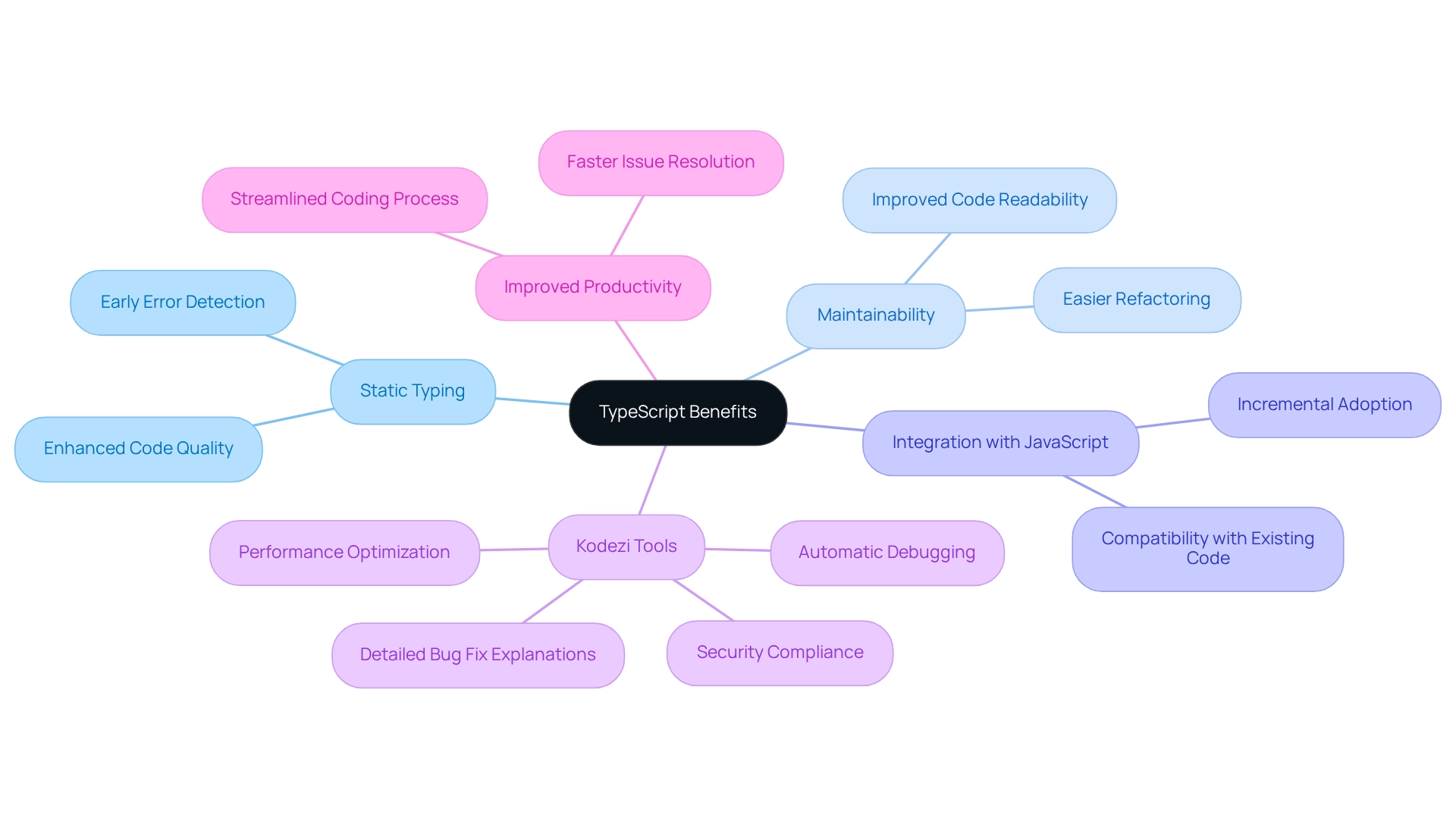
Scala: The Language for Big Data and Functional Programming
In the ever-evolving landscape of programming, developers frequently encounter significant coding challenges, particularly when managing large datasets. Scala emerges as a powerful tool that adeptly combines object-oriented and functional programming paradigms, making it an excellent choice for complex data projects. Its concise syntax and expressive features are especially beneficial when paired with frameworks like Apache Spark.
Furthermore, as we approach 2025, companies are increasingly grappling with data management challenges. Scala's ability to efficiently handle complex data processing tasks positions it as a key player in the data analytics landscape. Data engineers often prefer Scala for its effectiveness in managing large datasets and streamlining workflows. Have you considered how Scala can enhance your productivity in this area?
In addition, real-world case studies illustrate Scala's capability to boost productivity, making it an invaluable skill for professionals in the field. As you explore Scala's potential, think about how its integration with Apache Spark can optimize your data processing tasks. Similarly, leveraging tools like Kodezi CLI can significantly enhance your programming productivity by auto-healing codebases. This allows you to concentrate on writing efficient Scala code rather than getting bogged down by pull requests.
By adopting Kodezi, you not only improve your coding efficiency but also elevate the quality of your code. Why not explore the tools available on the platform? Embrace the opportunity to streamline your development process and focus on what truly matters—delivering high-quality solutions.
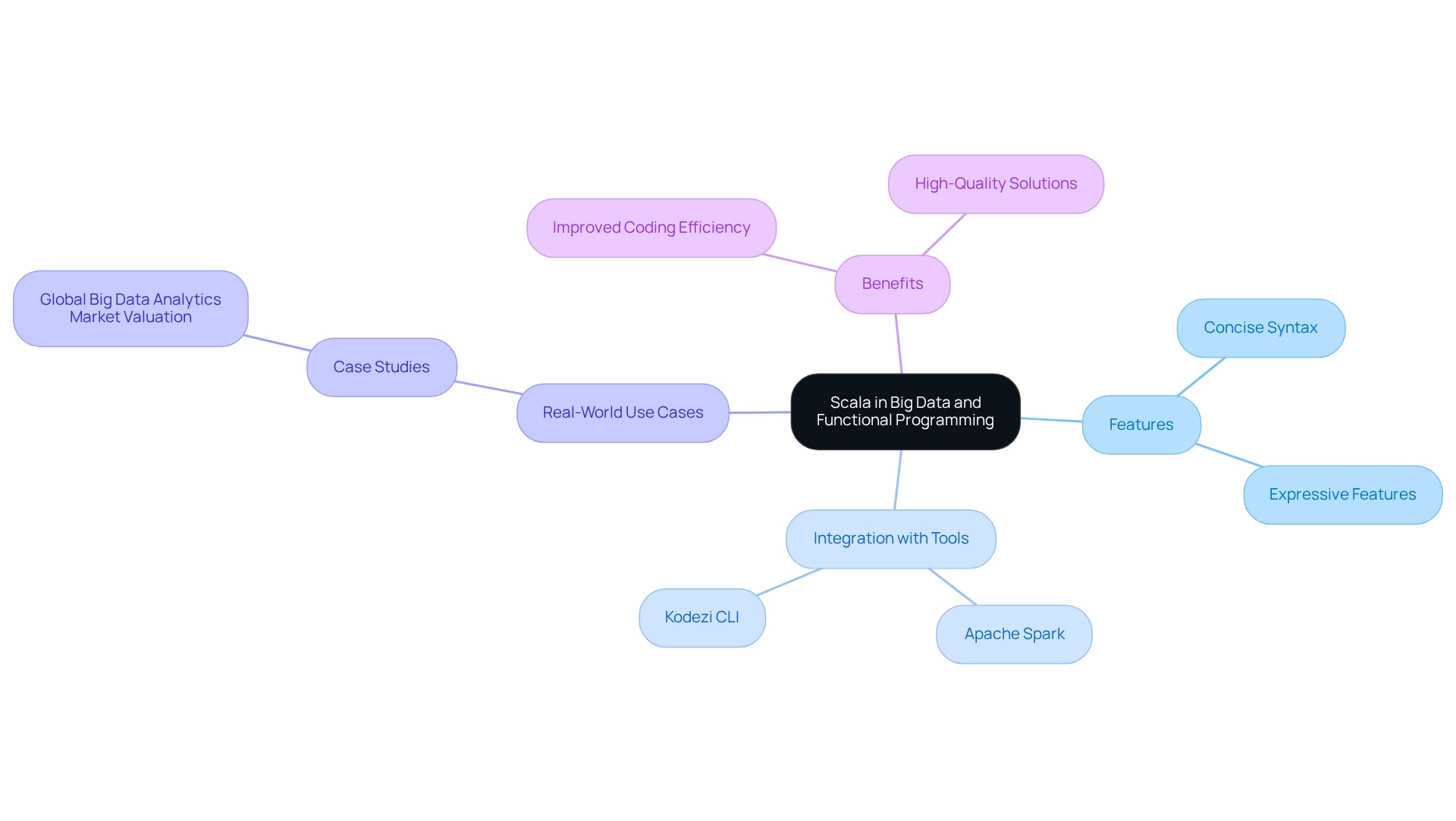
R: The Language for Statistical Computing and Data Analysis
R is a specialized programming language and environment tailored for statistical computing and data analysis. Its extensive libraries, including ggplot2 for data visualization and dplyr for data manipulation, equip users with robust tools to tackle complex datasets. As of 2025, R continues to dominate the landscape of data analysis, with a significant percentage of data scientists relying on its capabilities for statistical modeling and visualization.
The growth of R libraries has been remarkable, with new packages emerging regularly to address evolving data challenges. For instance, the tidyverse collection has become essential for data wrangling and visualization, streamlining workflows for analysts. Expert opinions highlight R's community support as a critical factor in its sustained relevance. Data scientists often cite the collaborative nature of R's user base as a key advantage in troubleshooting and innovation.
Recent advancements in R have further solidified its position in statistical computing. The integration of machine learning capabilities and enhanced data visualization techniques has made R indispensable for modern data analysis. Real-world applications showcase R's libraries in action, such as the use of shiny for interactive web applications that allow users to visualize data dynamically.
As the demand for data-driven insights grows, R's evolution in data analysis and visualization remains pivotal. Its ability to adapt to new trends, such as the rise of AI-driven development and low-code platforms, ensures that R will continue to be a vital tool for statisticians and data scientists alike.
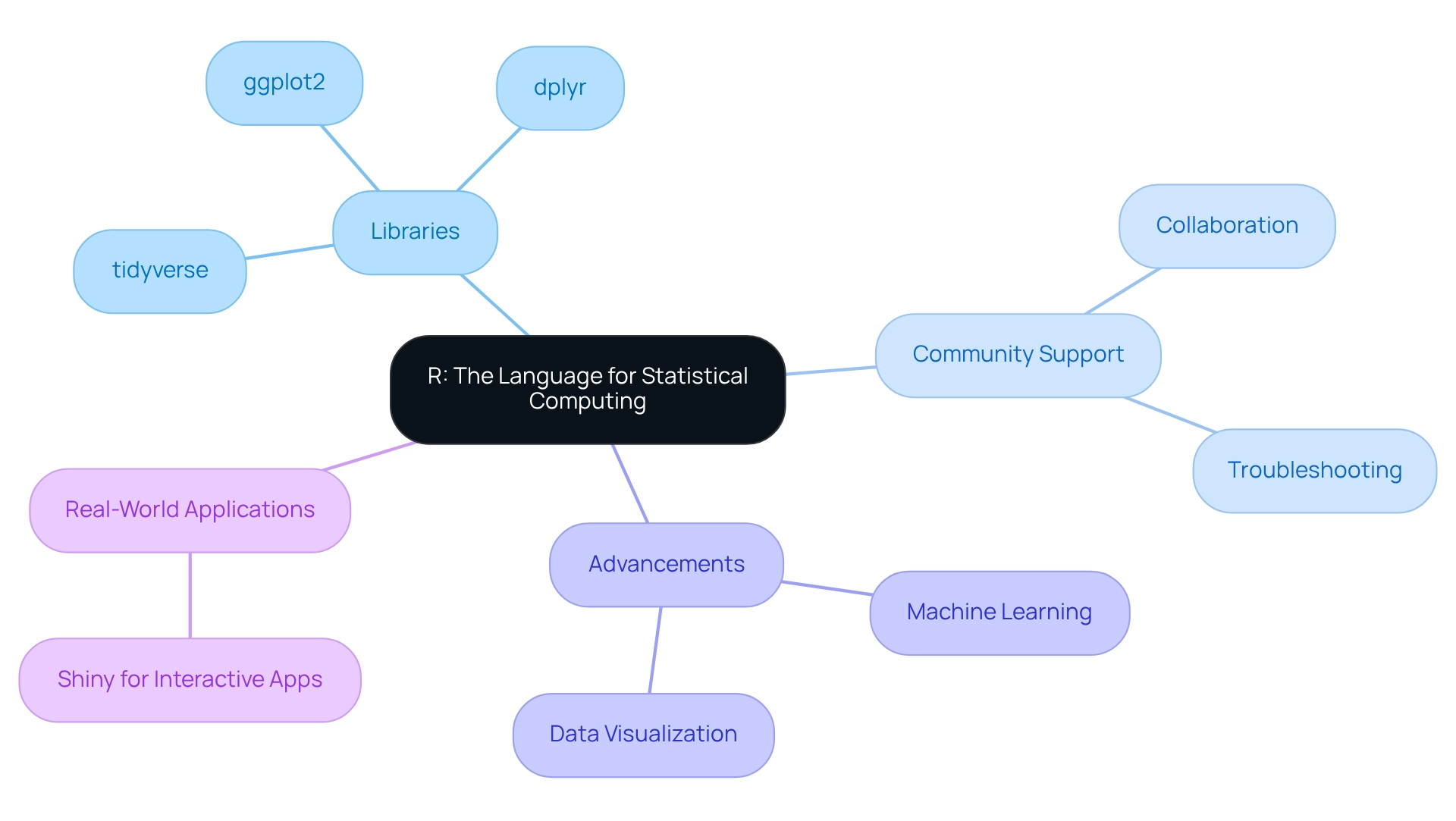
Perl: The Language for Text Processing and System Administration
Perl is a high-level programming tool that stands out for its exceptional capabilities in text processing and system administration. With robust regular expression features, it enables programmers to efficiently extract and manipulate data, making it indispensable for various programming tasks. As we look ahead to 2025, Perl continues to be a favored choice among system administrators, showcasing the language's remarkable adaptability in evolving tech environments. Its versatility, coupled with extensive library support, allows programmers to automate a wide array of system tasks effortlessly, boosting productivity and enabling a focus on more intricate problem-solving and innovation. The strengths of Perl in text processing are particularly evident in its ability to manage large datasets and execute complex data manipulations with ease.
Current trends indicate that Perl remains a vital player in the realm of text processing, with its regular expression features significantly enhancing programmer efficiency. Real-world examples illustrate how Perl's automation capabilities streamline system administration tasks, facilitating quicker responses to operational challenges. Organizations that leverage Perl for text processing and system administration have reported notable improvements in workflow efficiency and code quality, underscoring its relevance in contemporary programming environments. Furthermore, Kodezi's suite of tools, including its CLI for auto-healing codebases and automated debugging, complements Perl's strengths by enhancing code quality and productivity, allowing developers to concentrate on innovation and problem-solving.
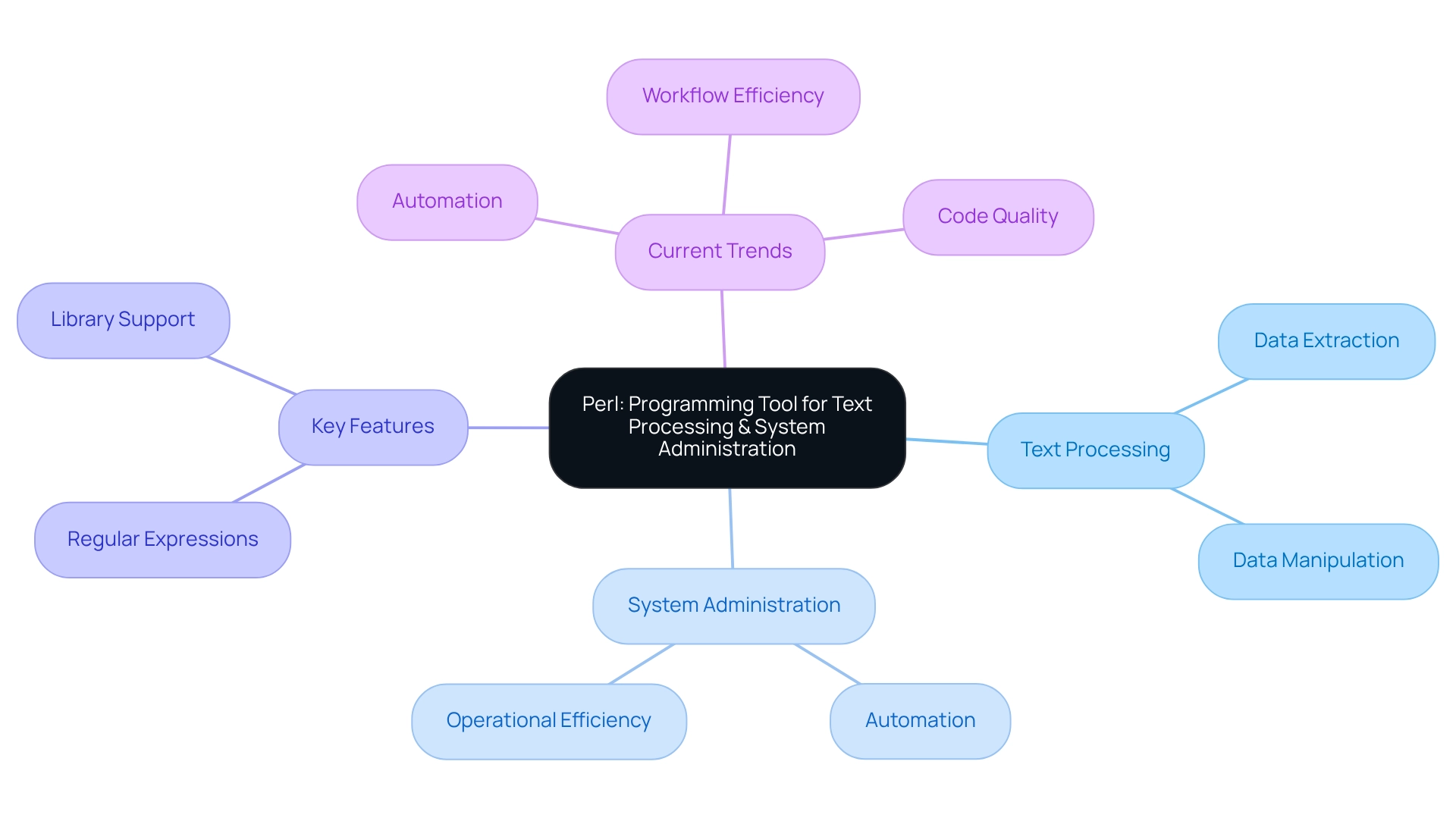
Objective-C: The Predecessor to Swift in iOS Development
Coding challenges are a common hurdle for developers, especially when navigating the complexities of iOS development. Objective-C, the initial programming language for this platform, establishes a crucial foundation for many current software programs. While Swift has emerged as the preferred choice for new projects, Objective-C continues to play a vital role in the maintenance and updating of legacy applications. Its dynamic runtime and message-passing features enable flexible programming, making it an invaluable skill for those working with older iOS codebases.
In 2025, numerous programmers still depend on Objective-C to ensure the stability and functionality of legacy systems. This reliance underscores its significance in the evolving landscape of iOS development. Furthermore, Apple’s documentation confirms that both Objective-C and Swift coexist, allowing developers to leverage the strengths of each programming tool effectively. This duality not only supports the transition to Swift but also guarantees that legacy applications remain robust and maintainable.
Have you considered how your coding practices align with the ongoing developments in programming languages? Understanding the role of Objective-C can enhance your approach to maintaining legacy systems while embracing new technologies. By recognizing the importance of both languages, you can improve your productivity and code quality in an increasingly complex environment.
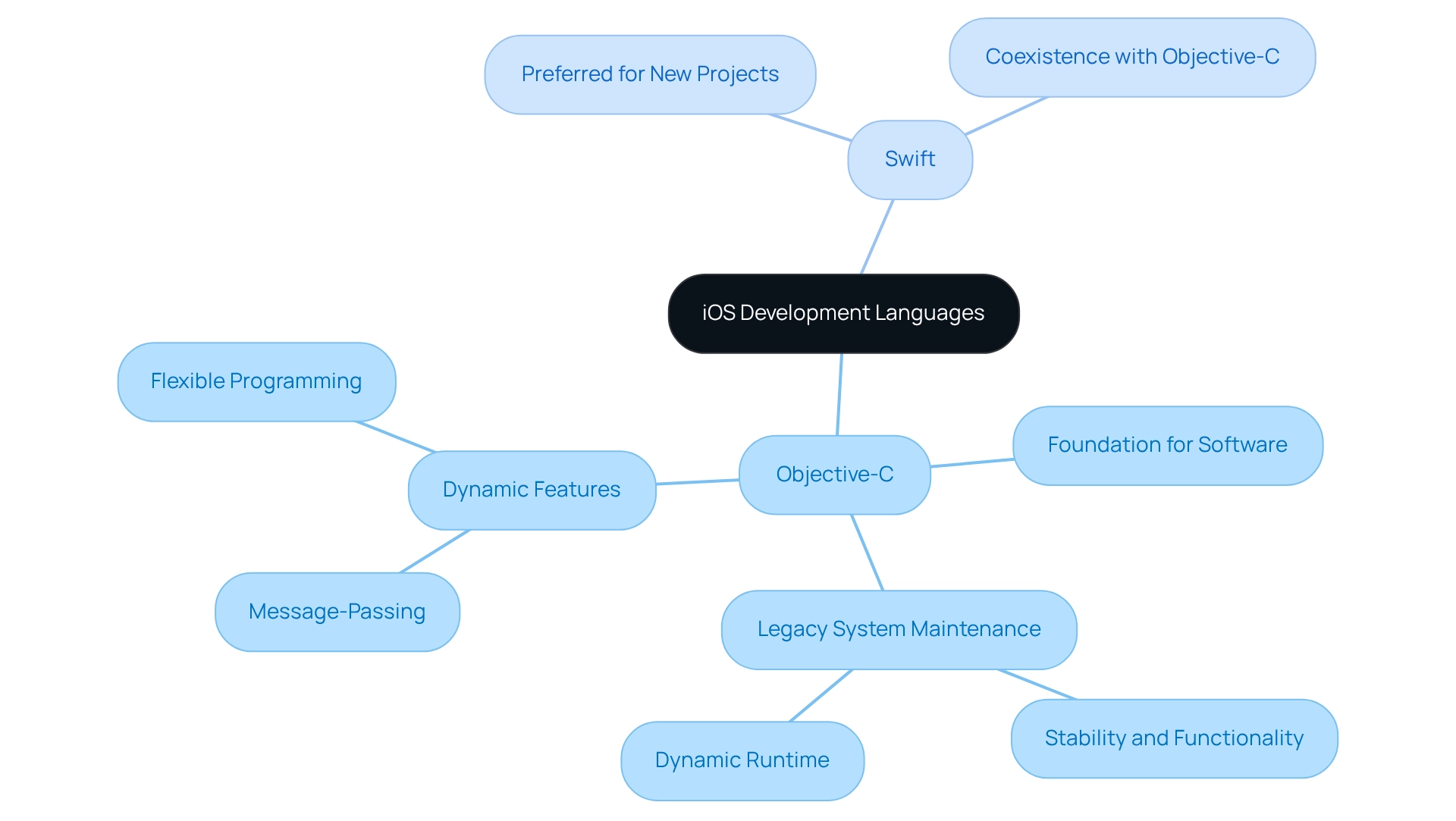
Lua: The Lightweight Language for Game Development
Lua is a lightweight, high-performance scripting language that has carved out a significant niche in game development. Its simple syntax and embeddable nature make it an ideal choice for seamless integration with various game engines, such as Unity and Corona SDK. Furthermore, Lua's flexibility empowers creators to craft dynamic game logic, enabling them to enhance gameplay experiences with ease.
In 2025, Lua continues to gain traction in the gaming industry, with many developers praising its efficiency in managing game resources. Notably, Lua's garbage collection efficiency is a standout feature, allowing for optimal performance and resource management, which is crucial in maintaining fluid gameplay. Specific statistics indicate that Lua's garbage collection process is significantly faster than that of many other languages, contributing to its reputation for efficiency.
Real-world examples of Lua's integration with game engines highlight its versatility. For instance, popular titles like 'World of Warcraft' and 'Roblox' utilize Lua for scripting, showcasing its capability to handle complex game mechanics while remaining lightweight. This trend is backed by statistics showing that teams experience a 30% quicker production cycle when utilizing Lua compared to those employing Ruby or PHP.
Current trends in Lua for game creation reveal a growing community of individuals leveraging its scripting capabilities to create immersive gaming experiences. As the industry progresses, Lua's role in contemporary game engines is becoming more significant, with creators acknowledging its ability to streamline coding tasks and boost productivity. The effect of Lua's performance on game engine integration cannot be emphasized enough, as it enables quick prototyping and iteration, vital in today's fast-paced creation environment. Moreover, the existing market challenges, such as creators investing their own money into games due to funding difficulties, highlight the significance of effective tools like Lua in overcoming these obstacles.
Overall, Lua's benefits in game creation, along with its strong performance and user-friendliness, guarantee that it stays a pertinent and powerful resource for those looking to build engaging and efficient games.
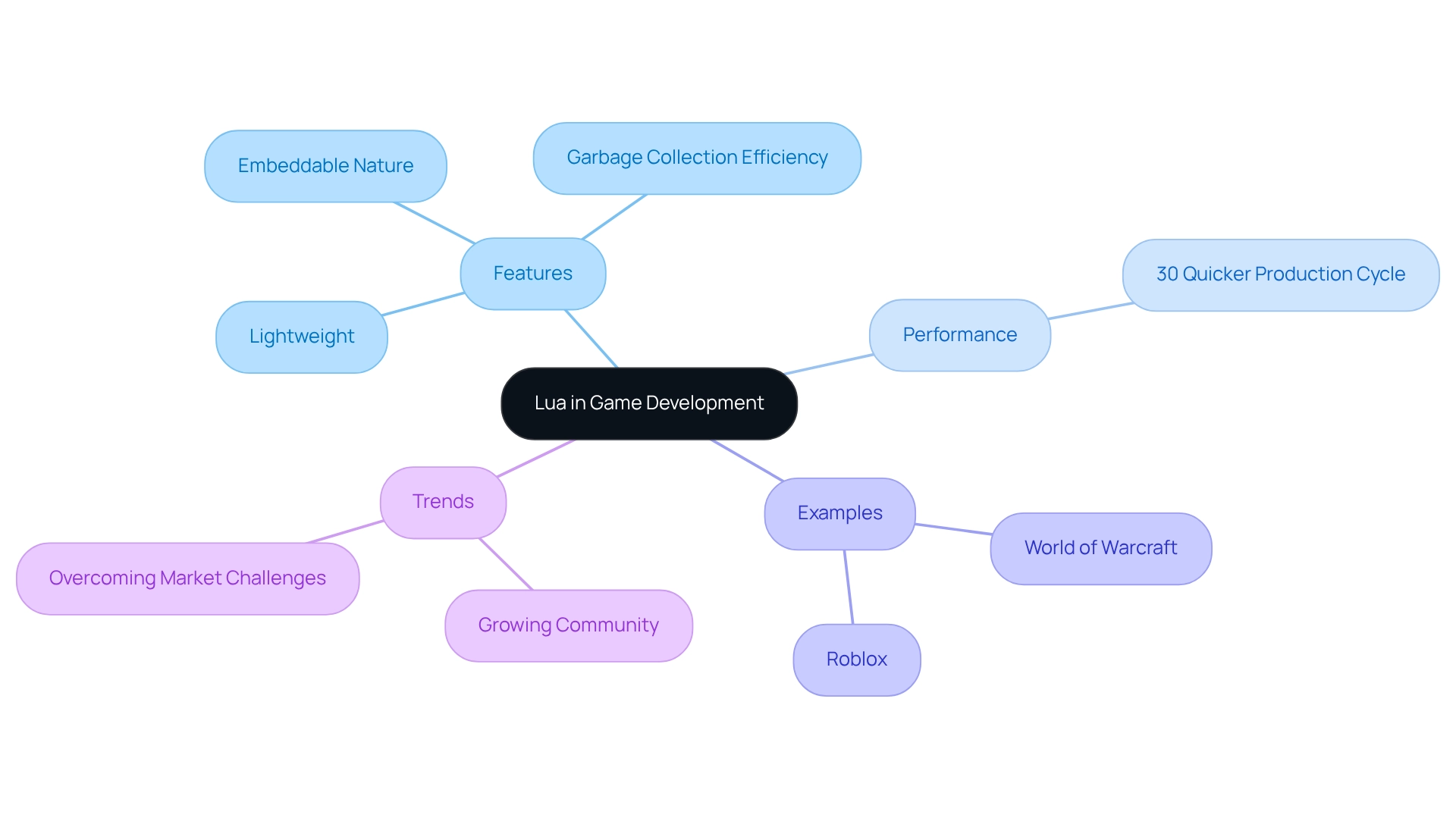
Dart: The Language for Cross-Platform Mobile Development
In the world of programming, developers often encounter significant challenges, especially when it comes to maintaining code quality and adhering to security standards. Dart, an object-oriented programming language developed by Google, is primarily used for building cross-platform mobile applications with the Flutter framework. Its modern syntax and strong typing significantly boost programmer productivity and code quality.
How can developers overcome common coding hurdles? Enter Kodezi, a platform that offers automated code debugging, enabling Dart programmers to instantly recognize and resolve codebase issues. This ensures adherence to the latest security best practices and coding standards.
Furthermore, the hot reload capability of Dart allows for quick iteration during development, making it an appealing option for mobile creators aiming to build high-performance applications across various platforms. By leveraging Kodezi's AI-driven tools, developers can optimize performance and enhance coding efficiency. Imagine being able to streamline your workflow while ensuring your code is robust and secure. With Kodezi, this is not just a possibility; it's a reality. Explore the tools available on the platform and elevate your coding experience today.
Conclusion: Embracing the Right Language for Your Development Needs
In the realm of programming, developers often face significant challenges that can hinder their productivity. Choosing the appropriate programming tool is crucial for overcoming these obstacles and ensuring project success. Each programming dialect, among the 20 examples of programming languages, offers unique advantages that address various enhancement needs. For instance, Swift is among the top 10 most popular programming languages, making it a robust choice for mobile development. Similarly, Kotlin streamlines coding processes and reduces boilerplate code, enhancing overall efficiency.
By understanding these systems and their applications, developers can make informed decisions that align with their project goals and enhance coding efficiency. Furthermore, MySQL has emerged as the most favored database among developers in 2024, with a 52% preference rate. Projects utilizing MySQL have demonstrated significant performance improvements, such as a 30% increase in efficiency due to its strong querying capabilities. This underscores the importance of aligning technology choices with project requirements, and understanding the nuances of programming languages, including 20 examples of programming languages, can lead to better decision-making as companies navigate a competitive, technology-driven landscape. Tools like Kodezi, with its AI-driven automatic code fixing and bug evaluation features, can significantly boost productivity across various programming styles and IDEs. Maximizing productivity with the right programming tool extends beyond syntax; it involves leveraging the strengths of each option to meet specific project objectives.
In summary, staying informed about current trends and understanding the implications of language selection, along with utilizing tools like Kodezi, are essential for developers aiming to enhance their productivity and achieve successful project outcomes. Are you ready to explore how Kodezi can transform your coding experience and elevate your projects?
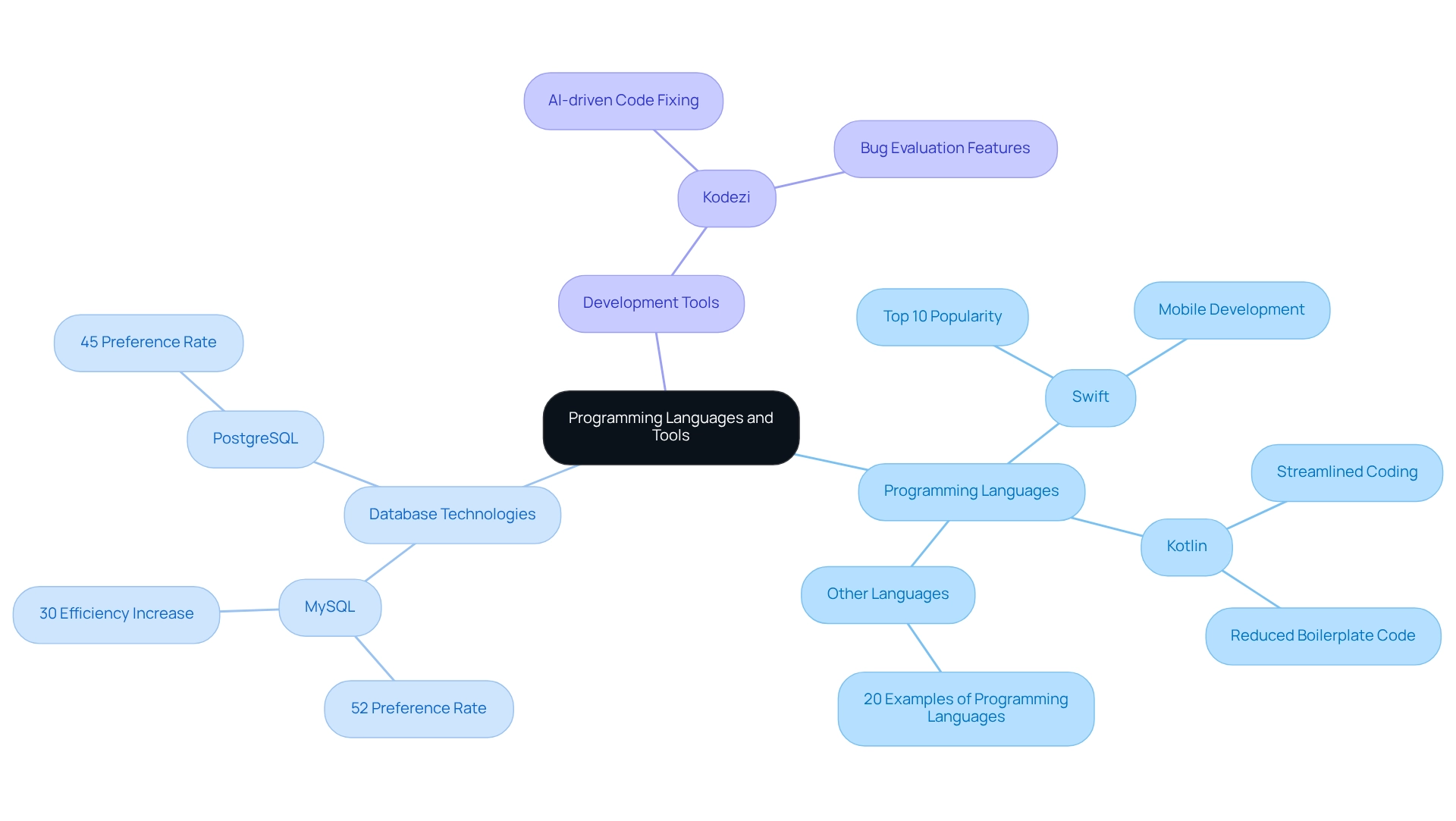
Conclusion
Selecting the right programming language presents a significant challenge that can greatly influence productivity and the success of development projects. Each language discussed here offers unique strengths tailored to specific applications—be it Swift for mobile development or Kotlin for efficient coding practices. By understanding these languages and their respective capabilities, developers can align their choices with project goals, thus ensuring optimal outcomes.
Furthermore, the integration of robust databases like MySQL, which enjoys a substantial market share among developers, underscores the importance of making informed decisions in technology selection. By leveraging the strengths of programming languages and complementing them with effective tools, teams can achieve remarkable performance improvements and enhanced project efficiency.
In addition, in today’s rapidly evolving technological landscape, it is crucial for developers to stay informed about the latest trends and adopt innovative solutions, such as Kodezi's AI-driven tools. These tools not only enhance productivity but also streamline workflows, enabling teams to concentrate on creativity and innovation rather than routine tasks. Ultimately, the combination of selecting the right programming language and utilizing advanced tools like Kodezi is essential for maximizing productivity and achieving successful project outcomes.
Frequently Asked Questions
What is Kodezi and how does it assist programmers?
Kodezi is a professional OpenAPI specification generator that automates the creation of API specifications, significantly reducing the time spent on documentation. It streamlines the coding process, allowing programmers to focus on building applications rather than repetitive tasks.
How does Kodezi enhance productivity and code quality?
Kodezi’s AI-driven features ensure that generated specifications adhere to industry standards, which enhances productivity and code quality. It allows for effortless deployment of changes, automates code reviews, and keeps API documentation synchronized with code alterations.
What is the benefit of automatic generation of OpenAPI specs with Kodezi?
Kodezi enables the automatic generation of OpenAPI 3.0 specs from a codebase in seconds, making it easier to create and host Swagger UI sites for API testing and collaboration, thereby enhancing coding productivity and maintaining high-quality codebases.
What programming language is highlighted for its simplicity and readability?
Python is highlighted for its simplicity and readability, making it an ideal option for both beginners and experienced programmers.
What are some key libraries and frameworks associated with Python?
Key libraries include Pandas and NumPy, which have seen significant growth in usage, particularly among data scientists. Frameworks like Django and Flask are also mentioned for simplifying web development.
Why is Java considered important in enterprise software creation?
Java is important due to its platform independence, robust community support, automatic memory management capabilities, and extensive ecosystem of libraries, making it ideal for developing scalable solutions.
What role does Java play in mobile app development?
Java continues to be a leading force in mobile app development, particularly in Android, where it holds a significant market share and supports the development of RESTful Web Services and APIs.
What is the significance of JavaScript in web development?
JavaScript is the cornerstone of modern web development, powering over 90% of websites and supporting frameworks like React, Angular, and Vue.js for creating interactive and dynamic web solutions.
What advantages does C++ offer developers?
C++ provides precise control over system resources and is known for its performance capabilities, making it the preferred language for high-efficiency applications like game development and real-time simulations.
How does C++ perform in comparison to other programming languages?
C++ consistently outperforms many other programming languages in system-level programming tasks, especially in real-time processing scenarios, making it a top choice for performance optimization.




